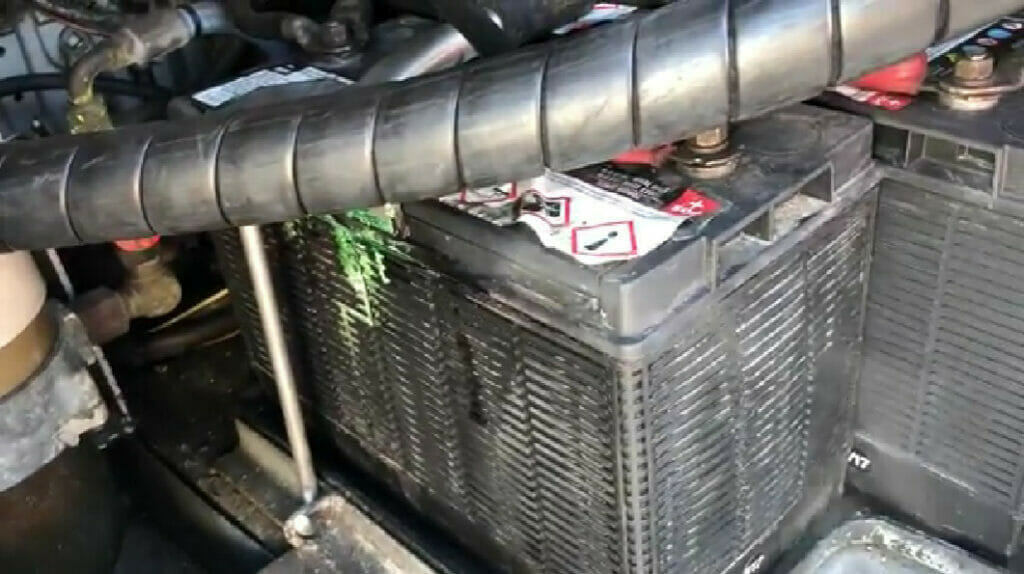What Does Battery Acid Smell Like? (Identify and Stay Safe)
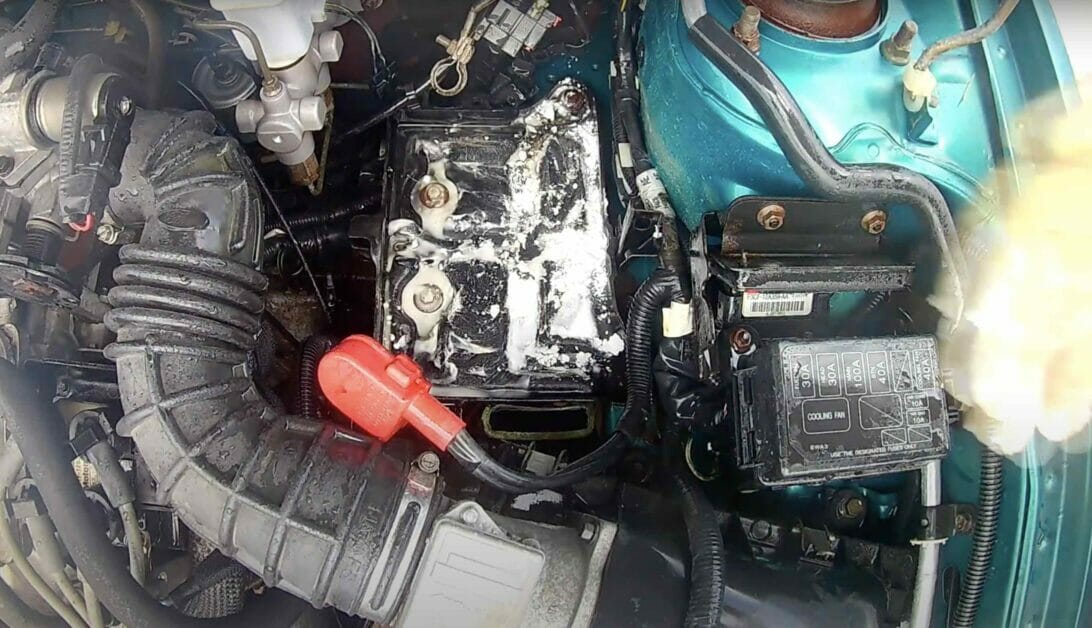
Ever smelled something funky around your car or electronic devices and wondered what it could be? I’m here to help you identify that mysterious odor, which might be battery acid.
Battery acid commonly smells like rotten eggs but may smell differently depending on type (we have a chart below). Yup, you heard that right – pretty gross, huh? This stench is mainly due to hydrogen sulfide gas, produced when a battery dies or leaks. It’s important to recognize this smell, as hydrogen sulfide is a flammable and potentially explosive gas.
In this article, I’ll help you understand the ins and outs of battery acid odor, how to identify it, and what to do if you come across this not-so-pleasant scent.
What Battery Acid Smells Like
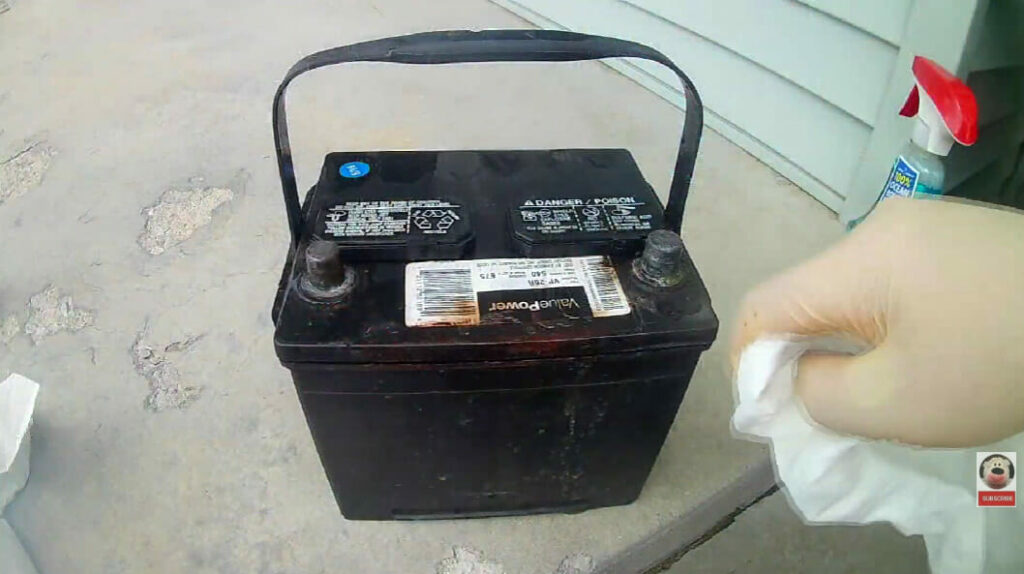
Rotten Eggs
Battery acid has a pretty distinct smell, and it’s not one you’ll soon forget. The first thing that comes to mind when I think about battery acid odor is the smell of rotten eggs.
I’ve dealt with my fair share of bad smells, but this one is unique. The rotten egg smell comes from hydrogen sulfide gas produced when a battery dies.
It’s not something you want to inhale deeply, trust me.
Vinegar
Another familiar smell associated with battery acid is vinegar. You might be wondering how in the world a dying battery could smell like vinegar, right?
Well, it’s because most battery acid contains sulfuric acid, which smells similar to vinegar. When mixed or diluted with water, battery acid creates hydrochloric acid, intensifying the smell of vinegar.
It can be bitter and burn your nose if you get too close.
Ether
Last but not least, let’s talk about ether. Some batteries, particularly those containing lithium salts, can have an ether-like odor.
Ether is a highly flammable liquid, so you’ll want to be extra cautious if you notice this smell around a battery.
When mixed with water, the mixture can become explosive, so handling these situations carefully is crucial.
That being said, whether you’re working on a project or just changing the battery in your car, being aware of these odors can help you identify possible issues and act accordingly.
Battery Acid Smell Characteristics
| Battery Type | Acid Smell Intensity | Odor Description |
|---|---|---|
| Lead-Acid | Strong | Pungent, sulfurous, rotten eggs-like |
| Lithium-ion | Faint to Moderate | Slightly sweet, chemical, metallic |
| Nickel-Cadmium | Mild | Faint, metallic, ammonia-like |
| Nickel-Metal | Moderate | Slightly acrid, metallic, vinegar-like |
| Hydride (NiMH) | Mild to Moderate | Faint, musty, slightly sweet, ammonia-like |
| Alkaline | Mild | Faint, metallic, bitter |
| Silver-Oxide | Faint | Slightly metallic, fishy |
As such, always exercise caution when handling batteries and refer to the manufacturer’s instructions and safety guidelines.
Causes of Battery Acid Smell
Leaking
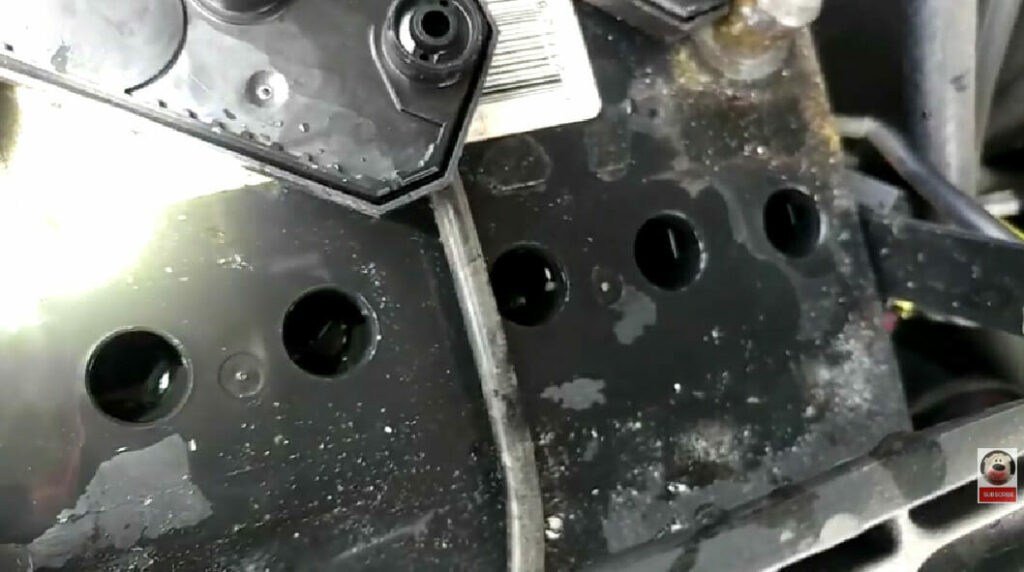
Do you know what I’ve noticed? When a car battery starts leaking, it can really stink up the place.
That nasty smell is because battery acid contains sulfuric acid, giving off a rotten egg aroma when it mixes with the lead in the battery.
If you’ve ever wondered what’s causing that smell, it’s actually the sulfur present in the battery acid. In case you spot a leak, make sure to handle the battery with care and keep it away from open flames.
Overcharging
Now let’s talk about overcharging. When a battery is overcharged, it can also produce some unpleasant odors.
The excessive voltage causes the electrolyte solution inside the battery to heat up and create gas. The gas produced is hydrogen sulfide, that same rotten egg smell we mentioned earlier.
It’s important to monitor your charging system to avoid overcharging and prevent that pesky odor.
Charging
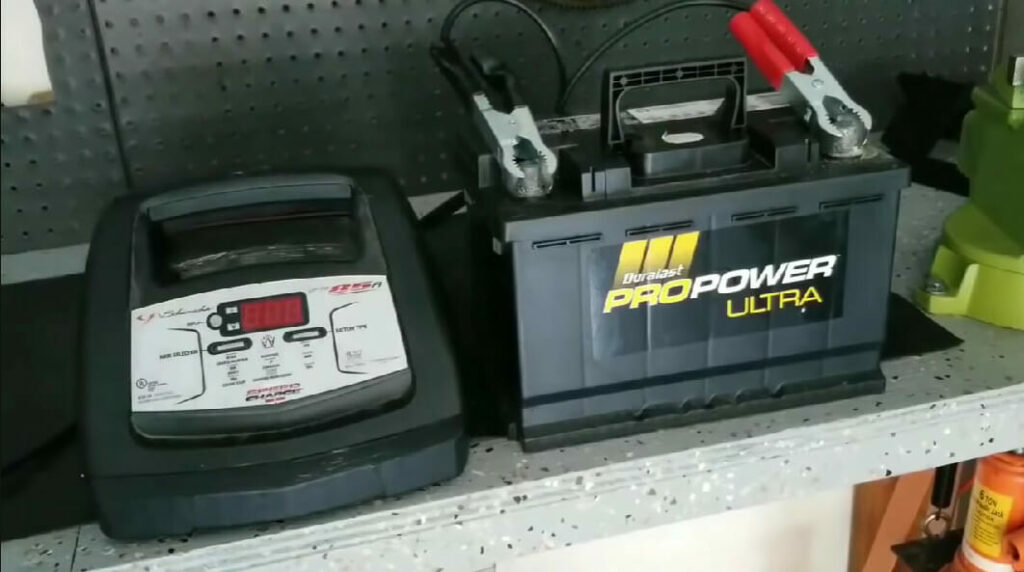
A faint whiff of that sulfurous smell can be present even during normal charging.
While charging, the battery generates a small amount of hydrogen sulfide gas, converting chemical to electrical energy.
But don’t worry; this is typically a low concentration and should not pose major safety concerns. Just make sure your battery is in a well-ventilated area to disperse the smell and minimize any risks.
Dying Battery
Old and dying batteries can also create that nasty battery acid smell. When a battery ages, it loses its ability to hold a charge and might even emit a funky smell.
If you’re experiencing frequent battery problems and can’t seem to shake that odor, it’s probably time to replace your battery.
Just monitor your battery and charging system to avoid these smelly situations. Doing so can ensure a safe and pleasant driving experience, and your nose will thank you!
Dangers of Battery Acid Smell
Toxicity
Battery acid is no joke. It’s extremely toxic, and the fumes it releases can be harmful when you breathe them in.
The smell of battery acid usually indicates some leakage, which means harmful substances may be in the air.
Don’t take this lightly! Definitely keep a safe distance from any exposed battery acid or fumes to protect yourself.
Ingestion Hazards
You might think this is a no-brainer but never ingest battery acid seriously. Not only are the electrolytes in it corrosive, but they can also lead to painful burns in your throat, stomach, and digestive tract.
Accidental ingestion of battery acid can cause severe health effects, including nausea, vomiting, and diarrhea. So remember, safety first – keep your batteries out of reach, especially from children and pets.
Respiratory Hazards
Exposure to battery acid fumes may lead to respiratory problems, such as irritation, difficulty breathing, and even a burning sensation in your chest.
If you have any pre-existing respiratory conditions, like asthma, steer clear of battery acid fumes. They can potentially trigger an attack.
Skin and Eye Irritation Risks
Trust me; battery acid is no friend to your skin and eyes. If you accidentally come into contact with it, you might experience irritation, burning, or even more severe damage.
To minimize discomfort and harm, neutralize any exposed skin immediately. And as for your eyes?
You guessed it – avoid getting battery acid anywhere near them, and rinse them out with water if an accident occurs.
Explosiveness
Battery acid isn’t just toxic and corrosive; it’s also involved in the production of hydrogen gas, which is highly flammable.
If you’re not careful, even a tiny spark near a leaking battery can cause an explosion. Take this information as another reminder that you must handle batteries cautiously.
Identifying a Battery Acid Smell in a Vehicle
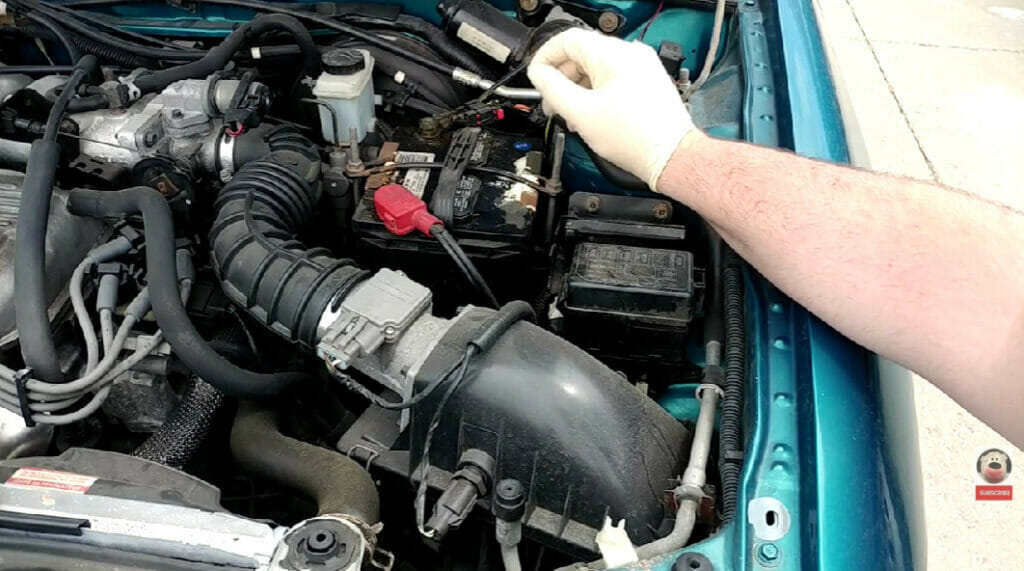
Now let me share some tricks to identify a battery acid smell in your vehicle.
Garage Smell
I can’t count the number of times I’ve walked into a garage and immediately detected something off.
It turns out that sometimes it’s the smell of battery acid. If you notice such an odor, it’s time to investigate.
Warmer Surface Near the Battery
Another easy giveaway is the warmth near the battery. If you feel a warmer surface near your vehicle’s battery, it might be a sign that the battery is leaking or there’s something wrong with it.
While at it, visually inspect your battery for any damages on the case or terminals.
Decline in Performance
If your vehicle has difficulty starting or powering on the electronics, I’d suggest looking at your battery.
The decline in performance can indicate that your battery is not holding a charge anymore, and if it’s combined with that funky smell of battery acid, it might be time to replace your battery.
As such, don’t hesitate to consult a professional if you’re unsure about the condition of your battery. Enjoy a smooth ride without the smell of rotten eggs, my friends!
Eliminating Battery Acid Smell
Ventilation and Air Freshness
A battery acid smell can be tough to handle. It’s like a strong sulfuric odor that makes you feel uncomfortable. But don’t worry; I’ve got you covered!
I opened all the windows and doors when faced with that rotten egg smell. This allows fresh air to circulate and helps eliminate that pesky odor, especially in a confined space like a garage.
In addition to ventilating the area, you can use air fresheners or even essential oils to create a more pleasant aroma in your space.
I’ve found that lemon or eucalyptus scents work really well for masking battery acid odors.
Homemade Solutions
When removing a battery acid smell, I love using homemade solutions.
They’re cost-effective and environmentally friendly! You can try neutralizing the acid with vinegar, baking soda, or lemon juice–these natural solutions are super effective at cutting through the smell.
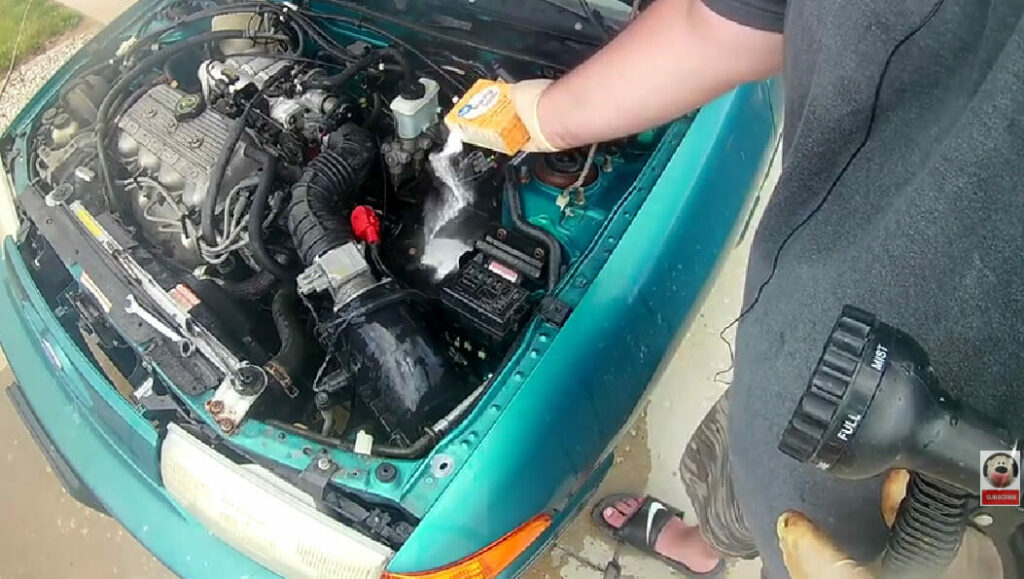
Wear gloves and use a cloth or sponge to apply the solution to the affected area.
Once you’ve done that, sprinkle some baking soda on the area, let it sit for a few minutes, and then vacuum it up–this will help to absorb any lingering smells. And voila, a much fresher space!
Maintaining Battery Performance
Now that we’ve tackled the smell let’s talk about preventing it from happening in the first place. Maintaining your battery’s performance is key to avoiding that nasty battery acid smell.
Regularly checking your battery for signs of damage or corrosion is a great start. If you notice any issues, address them immediately to prevent the release of that sulfuric odor.
Also, make sure to keep your battery properly hydrated. Believe it or not, adding water to your battery can stop that smell in its tracks! So, monitor your battery levels and add water when needed.
This will help with the smell and ensure your battery works efficiently and lasts longer.
So give these tips a try, and you’ll be able to eliminate that battery acid smell and keep your space smelling fresh and clean!
Remember, ventilation and air freshness, homemade solutions, and maintaining battery performance are the key components to keeping those odors at bay.
Wrapping Up
Battery acid has a unique and pungent odor. If you ever wonder what it smells like, think of sulfur, rotten eggs, or vinegar. It’s not a scent you’d want to bottle up and sell!
But don’t rely on your nostrils when identifying a battery acid leak. In fact, inhaling those strong fumes can really irritate your nose, throat, and lungs, so it’s not something you want to make a habit of.
If you’re unsure about a smell or suspect a leak, don’t be afraid to ask a specialist for advice.
Remember, stinky situations involving battery acid are best left to the experts.
Play it safe and give them a call if things start to smell a bit rotten eggy or like vinegar. That way, you can focus on enjoying life’s finer scents, like fresh-baked cookies or a blooming garden. Until next time!
References
Studies:
- Odor Thresholds for Chemicals with Established Occupational Health Standards, 3rd edition. https://www.aiha.org/education/marketplace/odor-thresholds-3rd-ed
Organizations:
- Occupational Safety and Health Administration (OSHA). https://www.osha.gov/
- National Institute for Occupational Safety and Health (NIOSH). https://www.cdc.gov/niosh/index.htm
Websites:
- ScienceDirect. https://www.sciencedirect.com/
- Environmental Protection Agency (EPA). https://www.epa.gov/
Video References
The Broken Life
JP Auto & Fleet Services
Videobob’s RV and Tour Bus Channel

